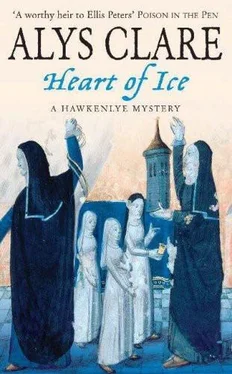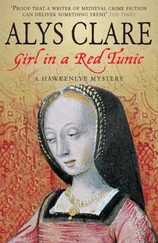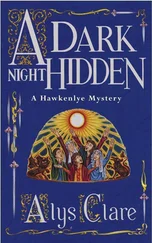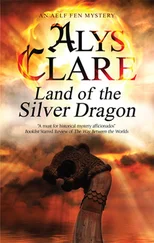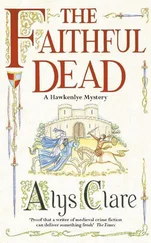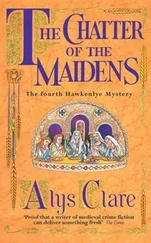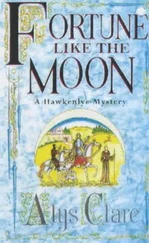Alys Clare - Heart of Ice
Здесь есть возможность читать онлайн «Alys Clare - Heart of Ice» весь текст электронной книги совершенно бесплатно (целиком полную версию без сокращений). В некоторых случаях можно слушать аудио, скачать через торрент в формате fb2 и присутствует краткое содержание. Год выпуска: 2007, Издательство: Hachette Littlehampton, Жанр: Исторический детектив, на английском языке. Описание произведения, (предисловие) а так же отзывы посетителей доступны на портале библиотеки ЛибКат.
- Название:Heart of Ice
- Автор:
- Издательство:Hachette Littlehampton
- Жанр:
- Год:2007
- ISBN:нет данных
- Рейтинг книги:4 / 5. Голосов: 1
-
Избранное:Добавить в избранное
- Отзывы:
-
Ваша оценка:
- 80
- 1
- 2
- 3
- 4
- 5
Heart of Ice: краткое содержание, описание и аннотация
Предлагаем к чтению аннотацию, описание, краткое содержание или предисловие (зависит от того, что написал сам автор книги «Heart of Ice»). Если вы не нашли необходимую информацию о книге — напишите в комментариях, мы постараемся отыскать её.
Heart of Ice — читать онлайн бесплатно полную книгу (весь текст) целиком
Ниже представлен текст книги, разбитый по страницам. Система сохранения места последней прочитанной страницы, позволяет с удобством читать онлайн бесплатно книгу «Heart of Ice», без необходимости каждый раз заново искать на чём Вы остановились. Поставьте закладку, и сможете в любой момент перейти на страницу, на которой закончили чтение.
Интервал:
Закладка:
‘Sir Josse, the Abbess Helewise has the sickness.’
There was an instant in which his whole soul rejected the news. Then, as it began to sink in, he felt a vast wail of grief well up inside him. No, oh, no!
He contained it. His voice harsh with emotion, he said gruffly, ‘Will she live?’
‘I do not know,’ the infirmarer said steadily, ‘although I fear the worst.’
‘Why did you not tell me sooner?’
‘We hoped — I hoped — to avoid it and save you this pain,’ she confessed. ‘I went on believing that she would suddenly take a turn for the better. But. .’ She held out empty hands, palms uppermost, in a hopeless gesture.
‘What can we do?’ He began pacing to and fro. ‘We must fetch the Eye from the Abbess’s room!’ he cried. ‘We’ve tried it once, I realise that, but perhaps-’
‘Sister Tiphaine has already done that,’ the infirmarer told him.
‘And?’
She hesitated. ‘In some cases, the dying appear to have been brought back.’
He knew the rest without her having to say it. ‘But not the Abbess.’
‘No. Dear Sir Josse, no.’
‘Should I have another try?’
Knowing how he loathed the Eye and everything to do with it, Sister Euphemia realised what the offer must have cost him. ‘I fear it would not help, for she is beyond swallowing any of the water.’
His eyes wild, he tore at his hair and then shouted, ‘ What , then? Do we just let her die?’
And Sister Euphemia said, very quietly, ‘I have just sent for Father Gilbert again.’
Much later that night, when in almost every place except for Hawkenlye Abbey all activity had ceased for the night and the world was deeply asleep, a dark shape crept from its lair out on the marshy land beside the river and made a quiet, unseen way into the town.
He had felt sick earlier and the headache had developed until the very daylight had been like a flaming, searing torch held up to his eyes. He had slept on the rotten straw-filled mattress that he found in the corner of the hovel, wrapping himself in his thick cloak and pulling the filthy sacking up to his neck when the shivering began. He had slept and, on waking, felt a little better. He found kindling and firewood and got a small, hot blaze going in the hearth in its circle of stones. Then he had prepared a hot drink and made himself eat — sparingly — from his dwindling supplies. The drink had, he reflected, probably done him more good than the food, for he carried a variety of remedies in his pack and this one had been sold to him by a stallholder in Paris who swore it would ease the worst headache and stop an incipient fever dead in his tracks.
Perhaps — the man gave a brief, grim smile — the stallholder had not after all used the word dead .
But the drug was strong — he thought he detected the bitterness of opium — and his depression of earlier in the day quickly gave way to an uplifting sense of elation.
Now, setting out on the faint track that led back along the river to Tonbridge, the man felt new energy coursing through him, a firm new resolve to finish the job and get out. He had packed up his belongings and fastened his pack behind his horse’s saddle, then worked hard for a short time to ensure that he had left no sign of his brief occupation of the hovel for others to find and question. He would leave his horse hidden nearby, he thought, slip into the house, do what he must do and then, before anybody had realised what had happened, be on his way south to the coast and home.
Where was home? He asked himself the question as he trudged along, waiting until the path was more clearly defined before he mounted; it would be folly to risk his horse putting a foot into some hidden hole in the rough ground and pulling up lame. Home. .
He had been born in a small town in Normandy, the product of a liaison between the daughter of a tanner and a man who had been a soldier under old Geoffrey Plantagenet, Henry II’s father, but who had lost his right hand and, no more use as a fighting man, spent the remainder of his life haunting inns, taverns, tap rooms. . anywhere, in fact, where someone would sell — even better, buy — him a drink. He had the patter down to a fine art and the hideous stump that was the end of his right arm evoked sympathy and revulsion in equal parts; people often stood him a mug of small beer or of thin, sharp wine purely to make him cover it up again.
This unlikely couple remained together for the duration of the woman’s pregnancy and for a further five or six years, when the foul odours of the tannery finally got the better of the one-handed soldier and he took off in the middle of the night, never to be seen in his home town again.
Surprisingly, he took his little son with him. The boy — he had been christened Gilles — had shown a precocious intelligence and a talent for mimicry and it was quite possible that the father saw the lad as a likely source of income. A spot of entertainment, a clever little trick that amused men halfway to drunkenness and made them laugh, and the sous would roll in.
Gilles soon found out how to talk himself out of trouble; in his father’s habitual haunts, not every broken man wanted female company for the fumble in the straw after the lamps were extinguished, and young Gilles grew up handsome of face and slim of body. As he entered adolescence he added fighting skills to his repertoire. He killed his first victim at the age of fourteen, a man unwise enough to corner him and hold a knife to his throat until he gave up his purse. Gilles had got his own knife unsheathed and into the man’s heart before the assailant had even finished his hoarsely whispered demands.
His father died when he was fifteen. Not that the demise of his parent made much difference to Gilles, for by then his father had sunk deep into alcoholism and barely recognised his son except when, as he often did, he tried to touch him for money. Gilles was already planning his own future and without the burden of his father — it was strange but, for all the old man’s faults, Gilles had loved him in a way and had never managed to persuade himself to abandon him — he was now free to pursue the path he had set. He knew of a certain local lord who, engaged in a quarrel with a neighbour, was in need of mercenary soldiers to support his cause. The lord laughed at Gilles when he presented himself as a potential fighting man, for he was still slightly built and had the face of an angel. But the graceful young body was strong as steel: Gilles, undeterred, drew his sword and showed the lord what he could do with it. He was engaged on the spot.
But Gilles did not intend to be a rank-and-file soldier all his life. The local lord was but the first step on the ladder that would win for Gilles the life he wanted and he used his position in that household ruthlessly, advancing his own cause to anyone with the slightest influence in higher circles who was prepared to listen to him. Within a year he was working for a minor duke; within five he had been engaged by a particularly aggressive bishop who needed the discreet removal of a persistent but prominent troublemaker. That murder was the first of the efficient and totally clandestine killings which were to become the trademark — although a bare handful of people knew it — of Gilles de Vaudreuil.
The rumour of an efficient and highly professional killer spread quietly and steadily through the ranks of Norman, Angevin and Plantagenet aristocratic circles; it was quite amazing, Gilles often thought, just how many rich, ruthless and influential men with their eyes firmly set on some personal goal required the disappearance of somebody else in order to achieve their ambition. As Gilles’s experience grew, so did the fee that he demanded; such was his reputation that they always paid him what he asked. By the time he was thirty he had lodged a small fortune safely away with the Knights Templar; their discretion was as assured as his own and he knew his money was safe. One day, he told himself, one day when I grow tired of killing, I shall return to that pretty little river deep in the hills of Normandy, buy myself a modest manor and some land and live a life of ease and comfort until I die.
Читать дальшеИнтервал:
Закладка:
Похожие книги на «Heart of Ice»
Представляем Вашему вниманию похожие книги на «Heart of Ice» списком для выбора. Мы отобрали схожую по названию и смыслу литературу в надежде предоставить читателям больше вариантов отыскать новые, интересные, ещё непрочитанные произведения.
Обсуждение, отзывы о книге «Heart of Ice» и просто собственные мнения читателей. Оставьте ваши комментарии, напишите, что Вы думаете о произведении, его смысле или главных героях. Укажите что конкретно понравилось, а что нет, и почему Вы так считаете.
